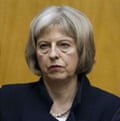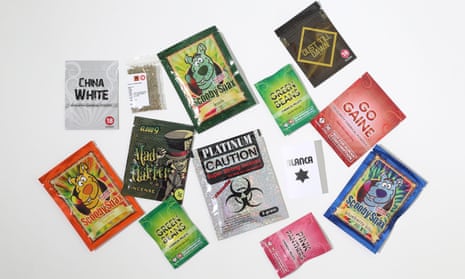The home secretary’s own expert drug advisers have said her bill introducing a blanket ban on “legal highs” risks “serious unintended consequences” and is unenforceable unless it is completely rewritten.
The advisory council on the misuse of drugs (ACMD) has written to Theresa May telling her that her legislation risks handing out seven-year prison sentences to the sellers of benign or even helpful herbal medicines, criminalising otherwise law-abiding young people and making the “directors” of pubs, clubs and even prisons liable for prosecution.
Prof Les Iversen, the ACMD chair, has told May the council is willing to suggest detailed amendments that would make sure her bill, which is going through the House of Lords, is based on evidence, is enforceable and proportionate, and achieves what it sets out to do while “minimising the potential for unintended consequences”.
The blanket ban on new psychoactive substances, as they are officially known, is highly unusual in British law, as it brings in a complete ban on all psychoactive substances and then introduces a list of exemptions for those in everyday use, such as alcohol and coffee.

The ACMD praised the home secretary for taking a “proactive” approach to the problem of legal highs, which are synthetic chemical compounds imitating the effects of traditional illicit drugs such as cannabis and ecstasy, and for not making their personal possession a criminal offence.
But in a devastating critique of May’s approach, the ACMD went on to detail eight problems with the bill that undermine its aim. These are:
- Widening the scope of the original ban far beyond “novel psychoactive substances” by leaving out the word novel so it covers all psychoactive substances. “It is almost impossible to list all desirable exemptions under the bill. As drafted, the bill may now include substances that are benign or even helpful to people including evidence-based herbal remedies that are not included on the current exemption list,” said the ACMD.
- The “psychoactivity of a substance cannot be unequivocally proven” in court. The ACMD said the only definitive way of determining the psychoactivity of a substance is by human experience and that cannot be legally documented. Its said there are proxy neurochemical tests that could be used but they may not stand up in court.
- The legislation fails to distinguish between potentially harmful and harmless substances, which means suppliers of benign or beneficial substances could face prosecution under the bill.
- Medical and scientific research will be seriously inhibited by its terms because an exemption for clinical trials does not cover laboratory research in academia or industry.
- Otherwise law-abiding young people will be criminalised and face heavy penalties for “social dealing” – clubbing together and buying small quantities online – with a potential discriminatory impact on black and minority ethnic groups.
- While the bill will lead to the closure of many “headshops”, the trade is likely to be displaced to illegal dealing networks and internet sales, with some users switching to more harmful substances.
- The directors of many premises and venues, including pubs, clubs, hostels, residential units, festivals and even prisons could be left liable for prosecution for legal highs used on their premises even though many are undetectable by drug dogs and urine tests.
- The bill will have a substantial impact on the sale of many herbal medicines. Only a very small number of “registered traditional medicines” would be exempt from the bill. The ACMD says the sellers of a large number of currently legal products could face legal sanctions if they fail to register. “Purchasing a benign, possibly evidence-based herbal product from a website outside the UK would appear to attract a seven-year prison tariff.”
Iversen said the council wanted talks with the home secretary over how to avoid the bill’s serious unintended consequences. It also wants to see a statutory duty for ministers to consult the council written into the bill, as has been the case for the last 40 years under the 1971 Misuse of Drugs Act.
The Home Office has said it will respond to the drug experts’ concerns before the next stage of the legislation in the Lords on 14 July.
“The advisory council on the misuse of drugs’ scientific advice is greatly valued by the government,” said a spokeswoman. “The home secretary has received Prof Les Iversen’s letter on the psychoactive substances bill and welcomes the ACMD’s support of a move to reduce and prevent harms and preventable deaths caused by these dangerous drugs to young people, adults, families and societies.
“We will respond to the letter and recommendations before the bill is next debated in the House of Lords.”

Comments (…)
Sign in or create your Guardian account to join the discussion